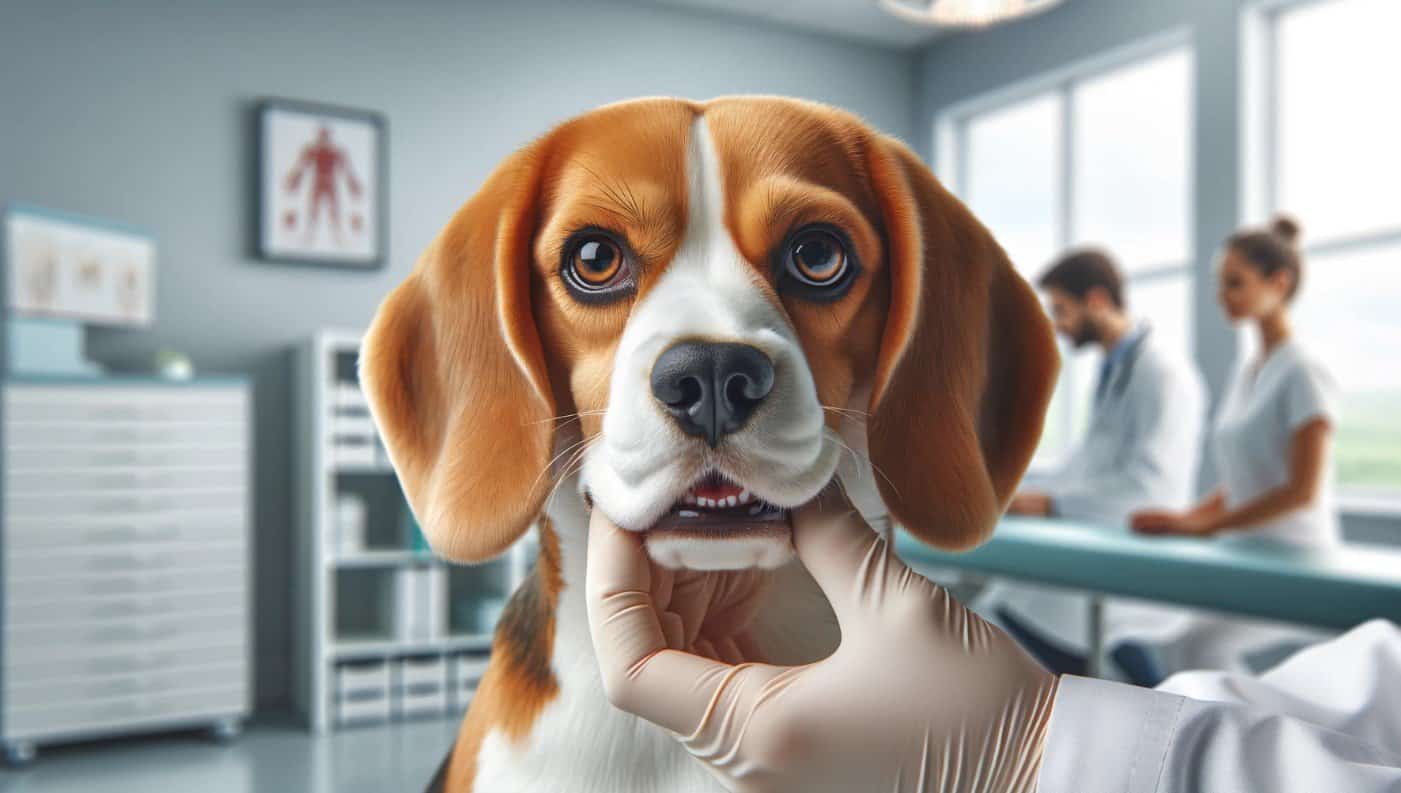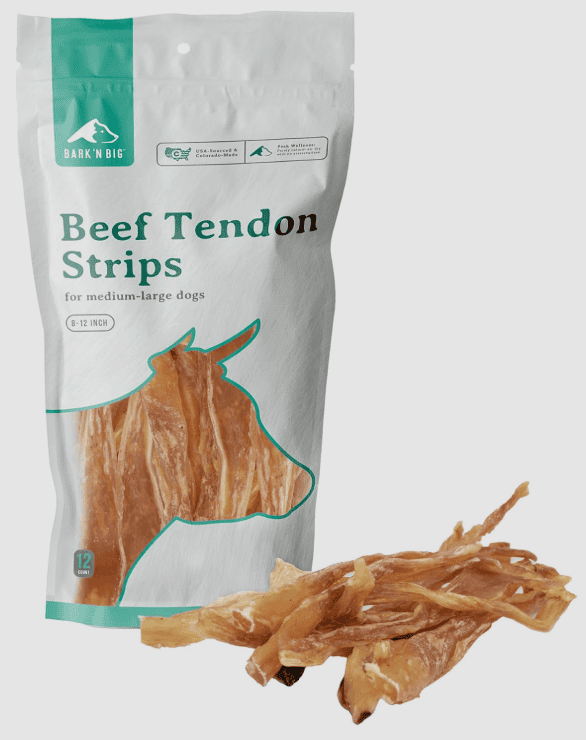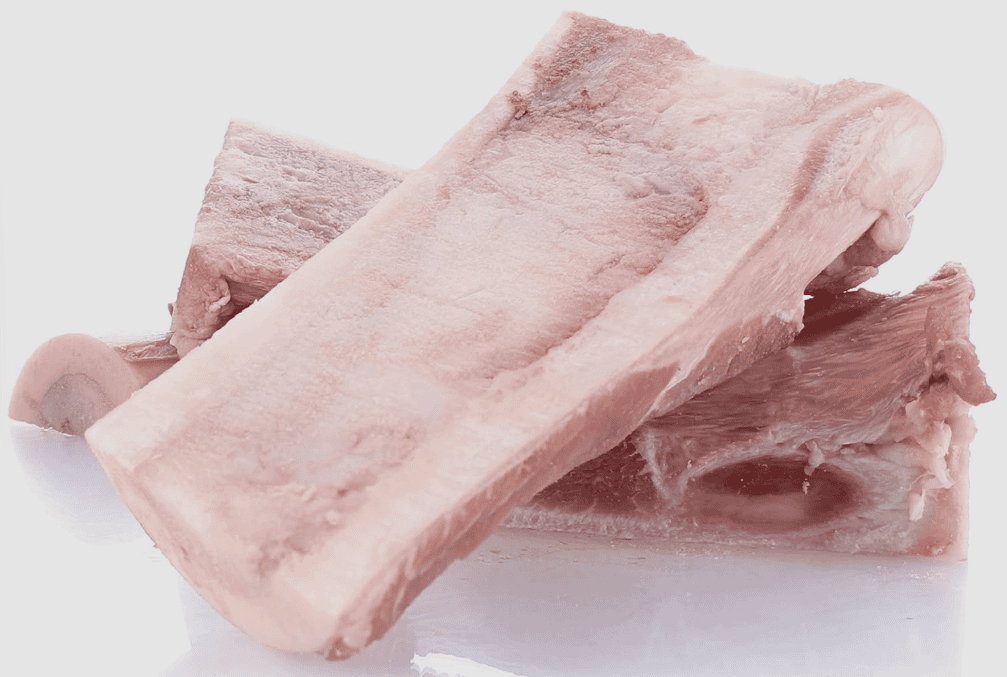Hi there, I’m Dr. Candy, your friendly holistic veterinarian. Today, we’re going to talk about a topic that’s close to my heart – Beagle Dental Health. You see, our furry friends’ oral hygiene is just as important as ours. In fact, dental health is directly linked to a dog’s overall wellbeing.

Beagles, with their adorable floppy ears and expressive eyes, are prone to certain dental issues that can affect their quality of life. As a pet parent, it’s crucial to know the signs of dental disease in Beagles and understand the best ways to prevent and treat these conditions.
From conventional treatments to my holistic approach, I’ll guide you through everything you need to know about Beagle teeth care. I’ll also share my recommended dental chews and products that can help keep your Beagle’s pearly whites in top shape. So, let’s get started on this journey towards better oral health for your beloved Beagle!

Signs of Dental Disease in Beagles
As a holistic veterinarian, I know how important it is to keep an eye on your Beagle’s dental health. This breed is known for its propensity for dental issues, and early detection can make all the difference. Here are some signs of dental disease in Beagles that you should be aware of.
Firstly, bad breath is often the most noticeable sign that your Beagle may have dental health issues. While it’s normal for dogs to have a certain doggy breath, a strong, unpleasant odor can indicate a problem. This is not just a social issue – bad breath in dogs can be a sign of serious underlying health conditions.
Another common sign of dental disease in Beagles is a change in eating or chewing habits. If your Beagle is avoiding hard food, chewing on one side of their mouth, or dropping food while eating, it could be a sign of dental discomfort. Similarly, excessive drooling or pawing at the mouth can also indicate a dental issue.
Physical changes to your Beagle’s mouth can also be a sign of dental disease. This can include discolored, broken, or missing teeth, red or swollen gums, and tartar buildup. Regularly checking your Beagle’s mouth can help you spot these changes early.
Finally, changes in behavior can be a sign of dental disease in Beagles. This can include being less playful, showing signs of aggression, or hiding, especially around meal times. Dental pain can be very uncomfortable for your Beagle and can cause changes in their behavior.
As a responsible Beagle parent, being aware of these signs of dental disease can help you catch any issues early and get your furry friend the help they need. Remember, prevention is always better than cure, so regular dental check-ups and good oral hygiene are key to maintaining your Beagle’s dental health.
Remember: Beagle Dental Health is not just about keeping their teeth clean – it’s about keeping them happy and healthy!
Common Dental Health Issues In Beagles
As a veterinarian, I’ve had numerous encounters with Beagle Dental Health issues. Beagles, like other breeds, are susceptible to a variety of oral health problems. Here are a few common ones:
- Periodontal Disease: This is the most prevalent dental issue in Beagles. It starts with plaque buildup, which hardens into tartar if not removed. This can lead to gum disease and tooth loss if left untreated.
- Broken Teeth: Beagles love to chew, and this can sometimes lead to broken or fractured teeth. It’s essential to provide safe chew toys and monitor their play to prevent this.
- Bad Breath: While it’s common for dogs to have less than fresh breath, extremely bad breath in your Beagle could indicate underlying dental issues.
- Oral Tumors: Beagles are prone to developing oral tumors. Regular dental check-ups can help identify any abnormal growths early on.
Understanding these common Beagle Dental Health issues is the first step towards prevention. Regular teeth cleanings, both at home and professionally, along with a balanced diet, can go a long way in maintaining your Beagle’s oral health. Remember, early detection is key, so if you notice any changes in your Beagle’s mouth or behavior, schedule a vet visit right away.

Conventional Dental Health Treatments
When it comes to Beagle Dental Health, there is a range of conventional treatments that can be employed to keep your furry friend’s teeth in the best possible condition. Let’s discuss two of the most common solutions.
Anesthetic Dental Cleanings
Anesthetic dental cleanings are a standard method used to thoroughly clean a Beagle’s teeth. Under general anesthesia, a veterinarian can perform a deep clean, removing plaque and tartar build-up that could lead to serious dental diseases. This procedure not only cleans the visible part of the teeth but also under the gum line where most dental problems begin.
While anesthetic dental cleanings are highly effective, they do come with certain risks. Beagles, like any breed, have the potential for health obstacles that could complicate anesthesia. These can include heart problems, drug sensitivities, or a history of seizures. In these cases, the vet may recommend alternative treatments or additional precautions. Furthermore, extreme age might also make anesthesia riskier. Always consult with your vet to weigh the benefits and risks.
Potential Individual Health Obstacles
Every Beagle is unique, and so are their health conditions. It’s important to understand that certain health issues can impact your Beagle’s dental health and the suitability of treatments. For instance, Beagles with heart problems might need special care during dental procedures to avoid unnecessary stress on their heart.
Drug sensitivities can also pose a challenge. Beagles may react adversely to certain medications used during dental procedures, including anesthesia. Seizures can also complicate matters as they can be triggered by stress or certain medications.
Lastly, age is a significant factor in dental health. Older Beagles may have more dental issues and could be at a higher risk during anesthetic procedures. Therefore, it’s crucial to have a comprehensive understanding of your Beagle’s overall health before deciding on any dental treatment.
Remember, the ultimate goal is to ensure your Beagle’s dental health without compromising their overall wellbeing. Keep in close communication with your vet, ask questions, and make sure you understand all the pros and cons of each treatment option. After all, your Beagle’s pearly whites are worth it!
Dr. Candy’s Holistic Approach To Oral & Dental Health
As a pet parent, it’s crucial to take a comprehensive approach to your Beagle’s dental health. This means going beyond conventional treatments and considering holistic methods as well. Dr. Candy, a renowned veterinary dentist, recommends a two-pronged holistic approach: a healthy diet and the use of oral health specific probiotics.
Diet- Low Carbs, Avoid Added Sugars, Enzymes In Fresh Food
One of the most significant factors affecting your Beagle’s dental health is their diet. Foods high in carbs and added sugars can lead to plaque build-up and, eventually, dental disease. Instead, opt for low-carb, sugar-free foods that promote oral health.
- Low-carb foods: Foods like lean meats, vegetables, and certain fruits are low in carbs and can help maintain your Beagle’s dental health. They also provide the necessary nutrients your dog needs for overall health.
- Avoid added sugars: Sugary foods are a no-no when it comes to your Beagle’s dental health. They can lead to cavities and other oral health issues. Always check the ingredients of your dog’s food and treats to ensure they’re free from added sugars.
- Enzymes in fresh food: Fresh foods are packed with natural enzymes that can help break down plaque and tartar. Incorporating fresh fruits and vegetables into your Beagle’s diet can help maintain their dental health.
Oral Health Specific Probiotics
Probiotics are beneficial bacteria that can help maintain your Beagle’s oral health. They work by balancing the oral microbiome, which can prevent the growth of harmful bacteria that cause dental disease.
Dr. Candy recommends Probiora for Dogs, an oral health targeted probiotic. This product is designed specifically for dogs and can help maintain your Beagle’s dental health when used as directed.
Remember, your Beagle’s dental health is an integral part of their overall well-being. By adopting Dr. Candy’s holistic approach, you can help ensure your Beagle has a healthy mouth and a happy life.

Now, let’s talk about dental chews and products for your Beagle. The market is flooded with a variety of dental chews, many of which are commercially promoted as being beneficial for your pet’s dental health. However, not all of these products deliver on their promises.
The Failure of Commercially Promoted Dental Chews
Commercially promoted dental chews often contain a cocktail of artificial ingredients, preservatives, and added sugars. While they might freshen your Beagle’s breath momentarily, they do not effectively combat the root causes of dental disease. Furthermore, these products can be hard on your pet’s stomach and can harm the beneficial bacteria in their gut. This is particularly true for products like drinking water additives, which are marketed as dental care solutions.
Dr. Candy’s Recommended Dental Chews & Products
So, what should you use instead to maintain your Beagle’s dental health? Dr. Candy recommends several natural alternatives. These include:
Tendons
Tendons are a fantastic natural chew for your Beagle. They are tough and fibrous, which helps to scrape off plaque and tartar from your dog’s teeth. Plus, they are a good source of protein and collagen, promoting good joint health.

Raw Marrow Bones
Raw marrow bones are another excellent choice for maintaining your dog’s dental health. They are a natural source of calcium and phosphorus, which are essential for healthy teeth and bones. Furthermore, the act of gnawing on bones can help to clean your Beagle’s teeth and gums.

Bully Sticks
Bully sticks are made from 100% beef muscle, providing a natural and digestible chew for your Beagle. They can effectively remove plaque and tartar and are a good source of protein. However, always supervise your dog while they’re chewing on a bully stick to prevent any choking hazard.

Remember, maintaining your Beagle’s dental health is not just about using the right products. Regular brushing, a healthy diet, and routine vet checks are also crucial. By taking these steps, you can ensure that your Beagle has a healthy, happy smile for years to come.
Your Beagle’s dental health is in your hands. Use the right products and follow the right practices to keep their teeth clean and healthy. This not only ensures a happy and comfortable life for them but also reduces your trips to the vet.
Choose wisely and keep that Beagle smile bright!
Frequently Asked Questions
1. What causes bad breath in beagles?
Bad breath in beagles can be caused by various factors such as poor dental hygiene, gum disease, tooth decay, or underlying health issues. It is important to regularly check your beagle’s dental health and address any potential problems.
2. How can I improve my beagle’s dental hygiene?
To improve your beagle’s dental hygiene, you can start by brushing their teeth regularly using a dog-friendly toothbrush and toothpaste. Additionally, providing dental chews or toys, feeding a balanced diet, and scheduling professional dental cleanings can help maintain their oral health.
3. Are there any home remedies for bad breath in beagles?
While it is always recommended to consult with a veterinarian for proper diagnosis and treatment, some home remedies that may help alleviate bad breath in beagles include adding parsley to their diet, using coconut oil for oil pulling, or providing them with water additives specifically designed for freshening breath.
4. When should I seek veterinary assistance for my beagle’s bad breath?
If your beagle’s bad breath persists despite your efforts to improve their dental hygiene, or if you notice other concerning symptoms such as swollen gums, excessive drooling, or difficulty eating, it is advisable to seek veterinary assistance. A professional examination can help identify any underlying dental or health issues.
